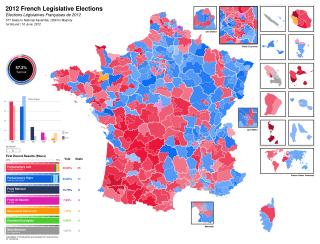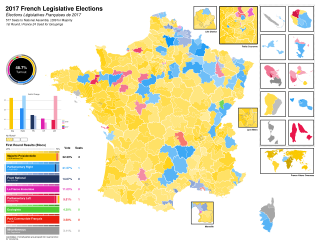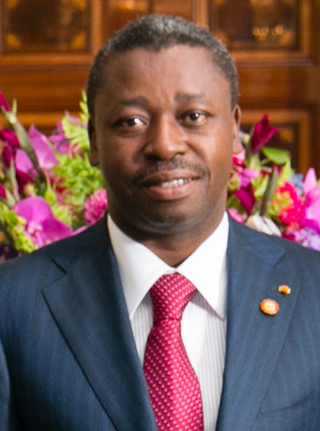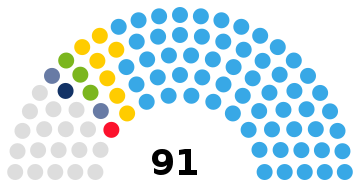The history of Togo can be traced to archaeological finds which indicate that ancient local tribes were able to produce pottery and process tin. During the period from the 11th century to the 16th century, the Ewé, the Mina, the Gun, and various other tribes entered the region. Most of them settled in coastal areas. The Portuguese arrived in the late 15th century, followed by other European powers. Until the 19th century, the coastal region was a major slave trade centre, earning Togo and the surrounding region the name "The Slave Coast".

Elections in Togo take place within the framework of a presidential system. Both the President and the National Assembly are directly elected by voters. Togo is a one party dominant state with the Union for the Republic in power.

Édouard Kodjovi "Edem" Kodjo, was a Togolese politician and diplomat. He was Secretary-General of the Organisation of African Unity from 1978 to 1983; later, in Togo, he was a prominent opposition leader after the introduction of multi-party politics. He served as Prime Minister from 1994 to 1996 and again from 2005 to 2006. Kodjo was President of the Patriotic Pan-African Convergence (CPP). Kodjo died on April 11, 2020, in Paris.

The Democratic Convention of African Peoples is a political party in Togo. It is a consultative member of Socialist International.

Parliamentary elections were held in Togo on October 14, 2007 for the 81 seats in the National Assembly. There were over 2,000 candidates, with 32 parties and 41 lists of independent candidates competing. The ruling Rally of the Togolese People (RPT) was victorious, winning a majority of 50 seats. The remaining seats were won by opposition parties; the Union of the Forces of Change (UFC) won 27 seats and the Action Committee for Renewal (CAR) won four seats. They were the first parliamentary elections since the beginning of multiparty politics in the early 1990s in which all major parties participated.

Parliamentary elections were held in Mali on 1 July 2007, with a second round on 22 July. In the first round, there were about 1,400 candidates for 147 seats in the National Assembly.

Parliamentary elections were held in the Republic of the Congo on 24 June 2007, with a second round initially planned for 22 July 2007, but then postponed to 5 August 2007. According to the National Commission of the Organization of the Elections (CONEL), 1,807 candidates stood in the first round for 137 seats in the National Assembly. The ruling Congolese Labour Party and parties and independent candidates allied with it won 125 seats, while two opposition parties won a combined 12 seats.

Parliamentary elections were held in Senegal on 3 June 2007. They had originally been planned to be held together with the presidential election on 25 February 2007, but were postponed. Fourteen parties or coalitions participated in the elections, but they were marked by a major opposition boycott. The ruling Sopi Coalition won 131 seats, including all 90 of the seats elected by majority voting.
Dama Dramani is a Togolese politician who was the President of the National Assembly of Togo from 2013 to 2018. He was Secretary-General of the Rally of the Togolese People (RPT), the ruling party, from 2003 to 2006, and following the 2007 parliamentary election he was President of the RPT Parliamentary Group in the National Assembly.

Legislative elections were held in France on 10 and 17 June 2012 to select the members of the 14th National Assembly of the Fifth Republic, a little over a month after the presidential election run-off held on 6 May.

The Republicans is a liberal-conservative political party in France, largely inspired by the tradition of Gaullism. The party was formed on 30 May 2015 as the re-incorporation of the Union for a Popular Movement (UMP), which had been established in 2002 under the leadership of then President of France Jacques Chirac.

Parliamentary elections were held in Gabon in 2018 alongside municipal elections; the first round was held on 6 October and the second round on 27 October. Despite losing 15 seats, the ruling Gabonese Democratic Party maintained its two-thirds majority in the National Assembly, winning 98 of the 143 seats.

Legislative elections were held in France on 11 and 18 June 2017 to elect the 577 members of the 15th National Assembly of the Fifth Republic. They followed the two-round presidential election won by Emmanuel Macron. The centrist party he founded in 2016, La République En Marche! (LREM), led an alliance with the centrist Democratic Movement (MoDem); together, the two parties won 350 of the 577 seats—a substantial majority—in the National Assembly, including an outright majority of 308 seats for LREM. The Socialist Party (PS) was reduced to 30 seats and the Republicans (LR) reduced to 112 seats, and both parties' allies also suffered from a marked drop in support; these were the lowest-ever scores for the centre-left and centre-right in the legislative elections. The movement founded by Jean-Luc Mélenchon, la France Insoumise (FI), secured 17 seats, enough for a group in the National Assembly. Among other major parties, the French Communist Party (PCF) secured ten and the National Front (FN) obtained eight seats. Both rounds of the legislative election were marked by record low turnout.

Renaissance (RE) is a liberal and centrist political party in France. The party was originally known as En Marche ! and later La République En Marche ! before adopting its current name in September 2022.

Legislative elections were held in French Polynesia on 22 April and 6 May 2018. On 22 April 2018, voters cast their ballots in the first round of the election to the Assembly of French Polynesia. A second round was held on 6 May 2018 for the three political parties that exceeded 12.5 percent of the vote in the first round. The new Tapura Huiraatira party emerged as the largest in the Assembly, winning 38 of the 57 seats in a landslide.

Presidential elections were held in Togo on 22 February 2020. Incumbent president Faure Gnassingbé of the Union for the Republic (UPR) was re-elected for his fourth term with 71% of the vote in the first round. His closest challenger was Agbéyomé Kodjo, a former prime minister and leader of the newly established Patriotic Movement for Democracy and Development, who received 19% of the vote.

Parliamentary elections were held in Tunisia on 17 December 2022 to elect the third Assembly of the Representatives of the People. Run-offs were held on 29 January 2023 in the vast majority of constituencies after only 21 candidates were elected in the first round.

General elections were held in the Democratic Republic of the Congo on 20 December 2023. Combined elections were held for the President, 484 of the 500 members of the National Assembly, 700 of the 716 elected members of the 26 provincial assemblies, and for the first time under the new constitution, 951 members of a scaled down number of commune (municipal) councils. On election day, the Congolese government extended voting to 21 December for polling stations that had not opened on 20 December. Agence France-Presse reported that some polling stations would open as late as 24 December.
Parliamentary elections were held in Benin on 8 January 2023 to elect all 109 members of the National Assembly. The preliminary results of the election were announced on 11 January. The result was a victory for parties supportive of President Patrice Talon, the Progressive Union and Republican Bloc, which together won 81 of the 109 seats.

Parliamentary elections are due to be held in Togo in 2024.















